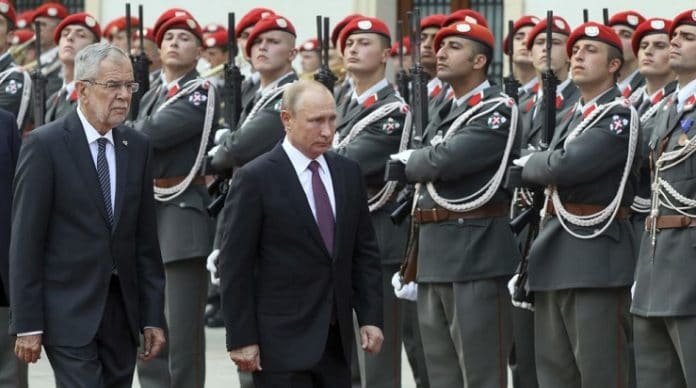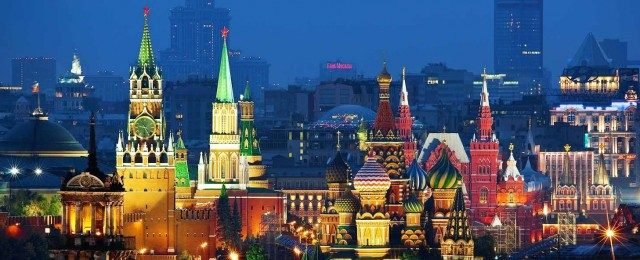
Putin Visits Austria: Maybe Everyone Has a Way Out
by Seth Ferris, … with New Eastern Outlook, Moscow

[ Editor’s Note: Seth Ferris has an established record of not fearing to dive into writing about complex historical geopolitical material. He brings us a prime example of that today with a detailed review of the “work in progress” EU-Russia simmering conflict.
The EU finds itself squarely in the middle between US unipolarism and lingering fears of Russian expansion, some of which has a real basis, and some not.
The military threat from Russia is total hogwash. Russia is completely maxed out on being able to defend its huge borders, but does have defense in depth due to its huge interior lines of communication and logistics capability.
As far as projecting power goes, Russia is limited to its own border areas, plus limited manpower excursions with a small footprint like in Syria, where its modern military equipment and Special Ops people are the major impact.
Russian does not have the military power to advance into the EU, garrison it, and protect its lines of communication back to the Russian border. Such an event would expose the advancing Russian force to being ground down, where losses would weaken its ability to defend the homeland from a major attack on a different flank.

Despite advances in traditional military equipment, Russia cannot survive a war of attrition against the West’s 10+ to 1 advantage that would rule the day, leaving the nuclear option as the only stabilizing factor.
So that leaves us at a crossroads, where we see a fake military threat straw dog created by the West to advance its real goal, which is to dominate the EU economically, partly as a tool for doing the same with Russia.
And, this leaves the EU caught in the middle, with contending options of “damned if we do, and damned if we don’t”, with Austria in play now. Which of these concerns is superior to the other is dividing the EU up along lines based on historical European conflicts and those from the Soviet era.
Fortunately we are seeing the economic war aspect proceeding in full bloom, versus the military one. But that begs the question if the US wins that, will we be closer to its being followed by a major military conflict, or will we be safer? Let me know what you think in the comments … Jim W. Dean ]
 Jim's Editor’s Notes are solely crowdfunded via PayPal
Jim's Editor’s Notes are solely crowdfunded via PayPal
Jim's work includes research, field trips, Heritage TV Legacy archiving & more. Thanks for helping. Click to donate >>

– First published … June 21, 2018 –
Everything Vladimir Putin does is perceived with great suspicion by the West. So it is surprising that more has not been made of his recent visit to Austria, as it is more significant than the lack of press coverage makes it appear.
It may be the first step of things to come. That in itself raises suspicions that the State visit has greater significance than the MSM is willing to report. Austria is a prime mover in the campaign to create a NEW kind of Europe – a “Europe of Nations” which has different principles to the current European Union model.
Rather than being all about harmonization and free trade, this Europe of Nations would be protectionist and nationalistic, prioritizing local people, problems and their jobs over freedom of movement and the greater collective good.
Poland and Hungary would be obvious members, and so would a number of other “second tier” European nations which feel they are not gaining the claimed benefits they had hoped for by being part of the rich man’s club.
As Putin pointed out in a TV interview prior to his visit, he is not actually trying to destroy the EU. Nor do the former Eastern Bloc states want to be dominated by Russia again. But this only makes it more interesting that a country which is a long standing part of the EU, but increasingly critical of what it is doing, should be talking to Putin when Russia is subject to EU sanctions.
Neither Russia nor Austria will develop better relations with the EU by talking to each other. Germany can talk to Russia, but that is because it takes a leadership role. Austria is smaller and came into the EU later.
It is an act of defiance, rather than support, for Austria to be talking to the EU without Germany in the room, although such a position would be popular in Austria itself, for a barrage of historical reasons and contemporary grudges.
The problem is ultimately one of confidence. When you know who you are and are happy with that, you can afford to be magnanimous and liberal. National differences don’t mean very much when everyone is prosperous, and wants to share their wealth and power with others to show they have it.
But that sort of Europe is too much for its younger members to cope with. In most cases they are still rediscovering their identities after decades of foreign domination. They can’t afford to share their wealth, such as it is, with liberal countries because that often means replacing one form of domination with another.
They can’t abide what they regard as mass immigration (which is nothing of the sort) because they think they can’t provide for their own people, and don’t have the means to break free from the economic ideas which have created this situation.
It is these concerns, amongst others, which created the Austrian love affair with its far right party, which is now part of its government. Austria isn’t a poor former Eastern Bloc member but a thriving democracy, once memorably described by the BBC as “as rich as its cakes”.
If the impoverished rump has a problem with the richer EU countries, those countries can offer to raise them up. If Austria has a problem with them, that’s a different question, and they know it.
Austria is well equipped to lead the “Europe of Nations” it desires into a new kind of partnership with Russia and other countries, based on respect for different principles. This may not be a good thing, but it is what happens when you go too far, too fast.
The EU still can’t believe that some of its members can’t understand what it’s about, in just the same way the US can’t understand why the countries whose governments it has enslaved and whose resources it has exploited don’t think it is the saviour of humanity.
Partnership between Austria and Russia might create a reality too unpleasant for the EU to contemplate, made even worse by the fact that Austria isn’t trying to leave the EU, but reshape it from within.
Friends under the bed
When the Soviet Union collapsed very few of its newly independent and democratic former parts wanted anything to do with Russia any more. There had been times when relations were better – when many of these countries were being carved out of the Ottoman Empire with Russian help, being anti-Russian wasn’t the popular stance. But it will take a lot more than the current thirty years to convince its former victims that Russia is a desirable, rather than a convenient, partner.
The Austrians might be better disposed towards Russia because they never lived under Russian domination. But it is noticeable that its partners in the “Europe of Nations” project, who did, are not abandoning Austria for continuing to have good relations with Russia.
Despite all the pressure placed on such countries by the EU, which Ukraine in particular has experienced, they are not turning away from Austria for “fraternizing with the enemy”, even when they see Russia as more of an enemy than Austria does.
Countries like Poland and Slovakia have discovered that, as long as they remain clearly on the European side, they have more in common with Russia than they would publicly admit. Suddenly Russia doesn’t seem like the all-consuming monster. Their own more recent experience has opened them up to different aspects of Russia, and these are creating a hidden bond which may become stronger than they wish to publicly admit.
The newer EU members are on the “right side” of global politics, having been on the wrong side of it before and still having to live with that legacy. They still constantly have the finger pointed at them by the older EU members, who are fond of looking for signs that they might be regressing into the dark ages.
For small countries with very different recent histories, being able to survive within the EU at all is a considerable achievement. But if they fall short in any respect they are reminded that they are equal to the other members in theory, but not given anything like the same respect in practice
Therefore the former Eastern bloc or Soviet Union EU members are damned if they do and damned if they don’t. Joining the EU has brought them undeniable benefits, but also left them feeling that they can only enjoy those provided they learn their separate and inferior place. The only difference to Soviet times is that they are on a longer leash. They can grow in different directions now, but this will make no difference to their status at the end of the day.
Russia has never seen itself as the giant force the rest of the world thinks it is. In its own mind, it has expanded across the map merely to protect itself from other enemies on its borders. It has been told it is not part of this new united Europe, and therefore has no means of becoming part of it. So Russia’s perception of its own weakness and suffering is making some sense to those who have made the great leap it cannot make, but are still suffering themselves in their own estimations.
The Europe of Nations project is driven by the idea that domestic populations are poor relations when they should be proud, and must therefore be protected. Being inside the EU is still beneficial because it protects them from Russia. But from that vantage point they can see Russia as a strangely kindred spirit, as long as it can’t dominate them any more.
Style over substance
The countries which founded the then EEC after World War II were not in the same position as the countries which have joined it since. The original six had all been devastated by the war, regardless of which side they were on.
They got together to get rid of war the same way Eastern bloc states joined to get rid of the Russians. But they profited from the venture in a short period, and thus became interested in exporting their model in the same way rich people built houses with more window space than mortar during the days of the Window Tax

Faced with such benevolent neighbours, their new friends can’t compete. The EU does understand this, but can’t adapt to the situation because that would mean declaring itself a fraud. Integration must equal prosperity and then an enforced liberalism, as any crack in that logical chain renders the rest redundant. The EU is in no position to respond to the needs of its newer members, because it would lose the means of doing so if it did.
The EU is now in the position of the legendary billiards player Walter Lindrum. At one time Lindrum was a global celebrity, the unchallenged champion of his art. If you wanted to be good at billiards you had to learn from Lindrum, as none of the other greats could do the things he did
The trouble was, there was only so far any player could go in emulating Lindrum. Even the top professionals gave up trying, and either faded away or did other things with their lives. Amateurs turned to other activities they could master, which offered them some sort of future. Thanks to its greatest exponent, professional English billiards ceased to exist, because there was no longer a market for something the average player could never go and reproduce, even weakly, at their local club.
A more recent example might be the fashion brand Biba, once almost as famous as Lindrum had been. Having developed a certain popular style, it tried to reproduce that in every field. If you subscribed to Biba’s clothes, you also bought Biba baked beans and decorated your home with Biba wallpaper.
Eventually it could not get out of the creative and financial hole it had dug for itself – keeping all these balls in play at once required unvarying taste and equal demand for all items, which just didn’t exist. People couldn’t adopt the whole package, so ended up turning their backs on the whole thing, however much some elements fulfilled the needs of some of its patrons
Russia does offer an alternative to the second-tier European countries. It can provide additional economic and political benefits through its own networks. Provided these are complimentary rather than dominant, this could be acceptable to its former unwilling partners.
Furthermore, Russia would achieve such outcomes by helping these countries fulfill their national ambitions, rather than subsuming them to a certain style of doing business, as the EU does.
It may seem counter-intuitive that Russia would be doing this for countries it swallowed whole before. But the EU is leaving them to fend for themselves, without the means of doing so with their own resources.
If Russia can give them those means, but still respect their decision to be on the other side, it may do as much to prevent future conflict and revive Europe as the EEC founders did in the 1950s.
A persuasive future

Putin’s visit to Austria was supposed to be just another trip. But if he had wanted to make a statement about Russia’s future direction, Austria would have been the obvious place to do it.
There can be no doubt that Austria is at the heart of Europe politically as well as geographically, as it is just the sort of prosperous liberal democracy Western nations desire to be. But it is also a skeptic, as a result of its many national insecurities.
These were largely created by collective guilt over the Second World War, and the humiliation of being a tiny Alpine republic, seen as inferior to Germany, rather than the proud multinational empire, and model for Germany, Austria once had been. Let’s regain our past glories, then see about this sort of liberal Europe, is as much the mantra of Austria as it is of its poorer neighbours further east.
Russia is not allowed to be part of liberal Europe, presuming it wants to be, because it insists on doing things its own way, for its own reasons. Many do not like those reasons, and some of the suspicion of Kremlin motives is justified.
But it is prepared to show that its approach can win the most unlikely friends, and that it offers an alternative model which might be more useful to them in their present circumstances than the old model of Soviet domination was.
Putin’s task now is to show that Russia’s value as a model is greater than it threat as a dominator. If he can pull it off, the EU would be wiser to take more notice of the “Europe of Nations” idea, and make it its own, if it wants to continue to expand and prosper at the same time.
Even if it wants to believe in its chain of inevitability, that integration equals prosperity equals the higher values and self-assurance of liberalism, the EU has to understand that not all its members can subscribe to this right now, as the Brexit vote, in one of the largest and most prosperous European states, should have demonstrated.
If Russia’s appeal can become the EU’s appeal, the EU can get going again. If not, it will remain in place, but torn by conflicting visions Russia can exploit, and unable to cope with countries which rightly fear that possibility and come asking for help.
History often turns on events which aroused little interest at the time. The Great Schism between the Eastern and Western churches is generally dated to an event in 1054 which was not mentioned by but an occasional contemporary commentator. So who is to say where Vladimir Putin’s seemingly routine visit to little Austria will lead a greater Europe which has a problem with every direction it tries to go?
Seth Ferris, investigative journalist and political scientist, expert on Middle Eastern affairs, exclusively for the online magazine “New Eastern Outlook”.

Jim W. Dean is VT Editor Emeritus. He was an active editor on VT from 2010-2022. He was involved in operations, development, and writing, plus an active schedule of TV and radio interviews. He now writes and posts periodically for VT.
ATTENTION READERS
We See The World From All Sides and Want YOU To Be Fully InformedIn fact, intentional disinformation is a disgraceful scourge in media today. So to assuage any possible errant incorrect information posted herein, we strongly encourage you to seek corroboration from other non-VT sources before forming an educated opinion.
About VT - Policies & Disclosures - Comment Policy




It seems to me that there are many people in Europe who view the EU as a form of centralized government that has come about by stealth, not democracy: a government that has continued to grant itself ever greater powers without any reference to the citizens of the various previously independent sovereign states of which it is comprised – making its agenda clearly political and very little to do with the espoused goals of economic development for the common good.
It is generally accepted that the “one size fits all” common currency has greatly disadvantaged some members of the EU – as has the EU stance on relations with Russia, which some view as unnecessary and unhelpful.
The policies and diktats of the self-appointed government of the EU continue to generate a level of disaffection and dissension that may well lead to its disintegration, since its leadership is apparently too obstinate and too impetuous to recognize and accept the obvious signals of discontent sweeping the electorates of Europe and therefore cannot or will not make the required adjustments to survive, which in any case may already be too late.
Good review. My grandfather was in Austria during WWII, cleaning this country from Hitler’s troops. People of Austria honor soviet soldiers. And the modern Austria shows negative attitude to anti-Russian sanctions. We have many things to trade and cultural values to exchange. Smart people know well, that Russia will never attack EU. We have no moral right in our gens to act so. Besides, Austria is very very beautiful country!
P.s. But i’m against a naked sword in the Austrian soldier’s hand, flying near my President’s head. Even if this is a honorable tradition. Dangerous. Remembering Karlov in Turkey.
LS…
The Netherlands are under Zio Nazi rule and the Royal Cabal of Bilderberg Beatrix the Fake Queen of Orange ! Our Prime minister is a No Balls Idiot that whispers all the time: The Russians. The Russians. Bonuses are paid to third range clueless actors and newsreaders to blame The Russians. The Russians ! Sick making stupidity rules in the Netherlands !
Some of today’s neoconservatives are descendents of the Europeans who have been targeting Russia for more than a century so it, the assault on Russia, won’t end peacefully. Just saying.
Personally I view the EU as a vehicle constructed to put as many Nations under it’s umbrella as feasible, with the primary goal being the taxation of 350 million disparate souls by the Brussels elite. To do this they need Russia as the “boogeyman” and, they will always need a boogeyman. It’s a simple system, but effective. If Russia suddenly disappeared China is the logical replacement.
Comments are closed.